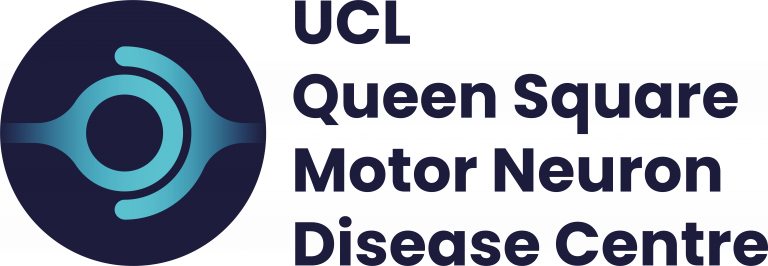Fifth UCL Queen Square Motor Neuron Disease Centre Hybrid Symposium
06 September 2024, 9:30 am–6:00 pm

New Technologies, AI and Big Data for ALS: From genetics to physiology to therapies
This event is free.
Event Information
Open to
- All
Availability
- Yes
Cost
- Free
Organiser
-
Debbie Hadley – Department of Neuromuscular Diseases, UCL Queen Square Institute of Neurology020 3108 2710
Location
-
Lecture Theatre378: Institute of Neurology, 33 Queen Square33 Queen SquareLondonWC1N 3BGUnited Kingdom
Programme
09:30 – 09:40 Welcome and an Introduction to the UCL QS MND Centre: Andrea Malaspina, Clinical Academic Lead for MND, UCL Queen Square
Session 1: Genetic Technologies
09:40 – 10:00 Jan Veldink, University Medical Center Utrecht / UMC Utrecht Brain Center, Netherlands - Project MinE: the rare variant architecture of ALS in 2024
10:00 – 10:20 Eran Hornstein, Department of Molecular Neuroscience, Weizmann Institute of Science, Israel - miRNA in ALS
10:20 – 10:40 Clotilde Lagier-Tourenne, Massachusetts General Hospital/Harvard Medical School - Combining genetic and pharmacological screens to identify new therapeutic targets in ALS
10:40 – 11:00 Coffee Break
11:00 – 11:20 Oscar Wilkins, UCL Queen Square Institute of Neurology - New Technologies for Gene Therapies in ALS
11:20 – 11:40 Andrew Bassett, Wellcome Sanger Institute - A CRISPR approach to studying neurodegenerative disease
Session 2: Proteins, Lipidomics and Metabolism
11:40 – 12:00 Tammaryn Lashley, UCL Queen Square Institute of Neurology - New Pathologies in ALS and FTD
12:00 – 12:20 Benjamin Ryskeldi-Falcon, MRC Laboratory of Molecular Biology, University of Cambridge - Atomic pathology of ALS and FTD by cryo-EM of amyloid filaments
12:20 – 12:40 Adrian Isaacs, UCL Queen Square Institute of Neurology - Insights from lipidomic approaches in ALS
12:40 – 13:00 Luc Dupuis, University of Strasbourg [Virtual] - FUS: a broad role in muscle and vulnerable neurons in neuromuscular diseases
13:00 – 14:00 Lunch Break
Session 3: Immune System
14:00 – 14:20 Sian Henson, William Harvey Research Institute – Queen Mary University of London - Immune senescence and ALS
14:20 – 14:40 Albert La Spada, University of California Irvine School of Medicine - Delineating Novel Pathways of Motor Neuron Demise in ALS
14:40 – 15:10 KEYNOTE: Steven Finkbeiner, Center for Systems and Therapeutics & Taube/Koret Center for Neurodegenerative Disease, Gladstone Institutes, University of California, San Francisco - AI and ALS: from image analysis to “thinking” microscopy
15:10 – 15:40 Tea Break
Session 4: AI and Big Data
15:40 – 16:00 Jon Rohrer, UCL Queen Square Institute of Neurology - Digital and remote biomarkers in ALS/FTD
16:00 – 16:20 Orla Hardiman, Trinity Biomedical Sciences Institute, Trinity College Dublin - PRECISION ALS
16:20 – 16:40 James Cole, University College London, Department of Computer Science - Machine learning for multivariate prognostic models in MND
16:40 – 16:50 10-minute comfort break
16:50 – 17:10 Clive Svendsen, Cedars Sinai, Medical Center, California [Virtual] - Using Answer ALS and organ chip models to revel specific deficits in iPSC derived motor neurons
17:10 – 17:20 Ben Cryar, Principal Analyst Opportunity Assessment Group, LifeArc - LifeArc’s Vision for Data & AI in ALS Research
17:20 – 17:40 Bethan Kilpatrick, BenevolentAI - AI augmented target identification in ALS, taking a disease mechanism approach, exemplified by our most advanced drug discovery programme
17:40 – 17:50 Closing Remarks – Linda Greensmith, Scientific Lead for NMD, UCL Queen Square and Ammar Al-Chalabi, Co-Director, UK MND Research Institute
Fifth UCL Queen Square Motor Neuron Disease Centre International Symposium has been approved by the Federation of the Royal Colleges of Physicians of the United Kingdom for 6 category 1 (external) CPD credit(s)
Other events in this series
 Close
Close

